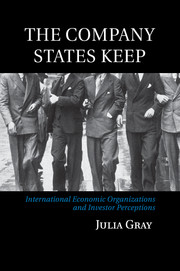Book contents
- Frontmatter
- Contents
- List of Figures
- List of Tables
- Acknowledgments
- 1 Introduction: The Company You Keep
- 2 International Institutions and Sovereign Risk
- 3 The Company You Keep in Comparative Perspective
- 4 The Effects of Good Company
- 5 When Emerging Markets Join Up with Bad Company
- 6 How Risk for Core Members Changes on IO Expansion
- 7 Conclusion
- Bibliography
- Index
1 - Introduction: The Company You Keep
Published online by Cambridge University Press: 05 October 2013
- Frontmatter
- Contents
- List of Figures
- List of Tables
- Acknowledgments
- 1 Introduction: The Company You Keep
- 2 International Institutions and Sovereign Risk
- 3 The Company You Keep in Comparative Perspective
- 4 The Effects of Good Company
- 5 When Emerging Markets Join Up with Bad Company
- 6 How Risk for Core Members Changes on IO Expansion
- 7 Conclusion
- Bibliography
- Index
Summary
Emerging markets the world over struggle for political as well as economic legitimacy on the international stage. Risk perceptions are an important component of their image, because access to credit on international markets can provide cash-strapped governments with much-needed financing. What can developing countries do to make themselves look attractive to private international creditors? How – in the absence of enforcement by third parties or truly binding contracts – can a country assure markets that it is a trustworthy investment, that it is both willing and able to service the loans it incurs? Emerging markets have a long history of shirking their foreign debt obligations; nearly half of the defaults in the last century occurred in developing countries. How can these countries convince investors of their intentions to make good on their debt obligations?
This book argues that regional economic organizations (REOs) can help solve cooperation problems in international credit markets. But perhaps counterintuitively, the rules and enforcement within those organizations tend to be not so important to investors. Rather than design, investors pay particular attention to the other member states in those organizations – that is, the company a country keeps. If emerging markets announce formal ties with other countries, investors look to whether those associated countries have low political risk, which gives clues as to their willingness to service their debt. International organization with responsible countries makes emerging markets look less risky – and by the same token, organizing with ill-behaved countries will make a new member look like more of a risky investment. Specifically, sovereign spreads – the risk premium that portfolio investors demand for holding a country's debt – fluctuate as a function of the other members of groups a country joins on the international stage.
- Type
- Chapter
- Information
- The Company States KeepInternational Economic Organizations and Investor Perceptions, pp. 1 - 15Publisher: Cambridge University PressPrint publication year: 2013



